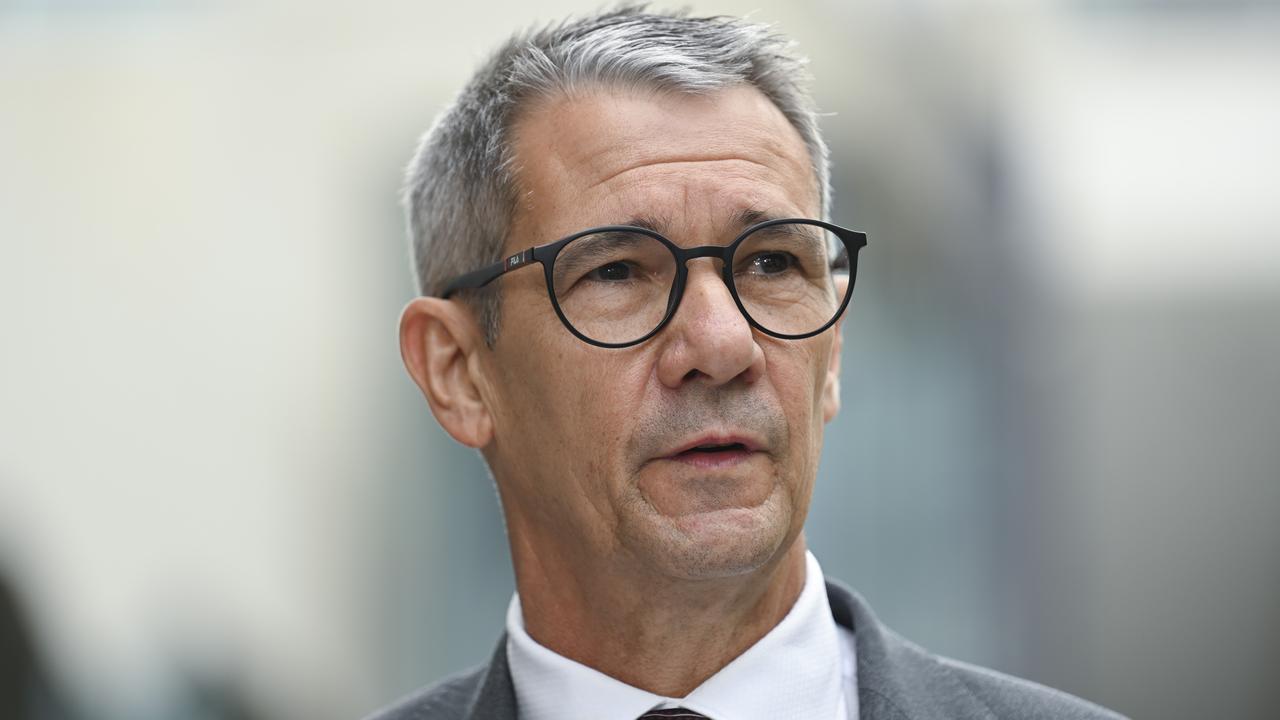A board of inquiry chair probing Bruce Lehrmann’s rape trial had “poisoned his mind” against the ACT’s former chief prosecutor before he even gave evidence in the inquiry, a barrister acting for the prosecutor has alleged in court.
Shane Drumgold’s legal battle with the inquiry which led to his resignation has begun in the ACT, with the Supreme Court being told of the extensive communications the inquiry’s chair Walter Sofronoff, KC, had with reporters throughout the probe.
The bulk of Tuesday’s hearing was spent examining the communications by journalists, including The Australian newspaper, and Mr Sofronoff throughout the inquiry.
Of the 91 calls made to journalists, Mr Sofronoff spoke with journalists from the national broadsheet for more than 11 hours.
Some calls and texts even occurred while Mr Drumgold was giving evidence in the witness box, the court was told.
A barrister acting for Mr Drumgold alleged Mr Sofronoff had “poisoned his mind” before the former prosecutor had even given evidence.
Mr Drumgold, the territory’s Director of Public Prosecutions for five years until his resignation, has launched legal action to challenge a report that found he engaged in misconduct during the trial of Mr Lehrmann, who was accused of raping his colleague Brittany Higgins in 2019.
Mr Lehrmann’s 2022 jury trial was declared a mistrial due to juror misconduct and a planned retrial was abandoned by prosecutors due to concerns about Ms Higgins’ mental health.
He pleaded not guilty and has continued to deny the allegations.
The subsequent inquiry chaired by Mr Sofronoff, a former Queensland Supreme Court justice, made several serious findings of misconduct against Mr Drumgold.
Mr Sofronoff found the former chief prosecutor “lost objectivity and did not act with fairness and detachment as was required by his role” during the trial, advanced a false claim of legal professional privilege over certain documents and misled the court about notes made during a meeting with journalist Lisa Wilkinson, before her infamous Logies speech, among other claims.
On Tuesday the court was told Mr Drumgold was abandoning several grounds in the proceedings, including claims the board of inquiry failed to comply with the law and some of his claims the findings were “legally unreasonable”.
Dan O’Gorman SC – acting for Mr Drumgold – said the focus on proceedings would be claims of a “reasonable apprehension of bias” advanced in his second ground of the application.
“What is of concern for ground two is if a fair-minded lay observer might reasonably apprehend that Mr Sofronoff might not bring an impartial mind to the resolution of the questions that were before him,” Mr O’Gorman told the court.
“There were these private communications that no-one knew about at the time.”
The court was told 91 calls were made between Mr Sofronoff and journalists between February 9 and August 2 last year.
A total of 73 were with The Australian newspaper and 51 were with one of its columnists, Janet Albrechtsen, the court was told.
She had been introduced to Mr Sofronoff through Hedley Thomas, the paper’s national chief correspondent and a renowned investigative journalist, who Mr O’Gorman described as the “conduit” between the pair.
Mr O’Gorman said they would be submitting Ms Albrechtsen was an “advocate” and receiving “favoured treatment” during her exchanges with Mr Sofronoff throughout the inquiry.
“What Mr Drumgold alleges is Mr Sofronoff’s association with Ms Albrechtsen, in particular, might be thought by a fair-minded observer to have diverted Mr Sofronoff from deciding the issues in his terms of reference, on their merit,” he said.
“We submit The Australian (and) Ms Albrechtsen engaged in media reporting adverse to Mr Drumgold.”
Mr O’Gorman told the court the articles published by Ms Albrechtsen “impugned” Mr Drumgold – whom he submitted was “the brunt of this negative reporting” – and cast Mr Lehrmann in a “favourable light”.
He submitted Ms Albrechtsen had an “extraordinary” amount of contact with Mr Sofronoff until the report was submitted.
“Information that was of importance to the inquiry and its deliberations … were passed on. Certain documents were passed on,” Mr O’Gorman said.
Mr O’Gorman said a fair-minded observer would have “real concerns as to what’s going on here”.
He submitted Mr Sofronoff did not bring an “unburdened mind” to the inquiry as a result of Ms Albrechtsen’s “bias”.
One exchange involved Mr Sofronoff and Ms Albrechtsen discussing a claim of malicious prosecution brought by Mr Lehrmann against Mr Drumgold, while others discussed a suppressed stay application.
Mr Sofronoff ends the exchange with: “Truly a pleasure to engage.”
In his report, Mr Sofronoff said Mr Drumgold “preyed on a junior lawyer’s inexperience” by requesting the lawyer to make a “misleading affidavit” concerning documents related to the trial.
Mr O’Gorman said Mr Sofronoff had texted Ms Albrechtsen during the inquiry in relation to this act, telling her: “What a thing to do to two young professionals under your mentorship.”
Others included discussions on the controversies surrounding Mr Drumgold, Ms Higgins, Mr Lehrmann and related parties and the police, Mr O’Gorman said.
He told the court: “One wonders why she is at all discussing with the inquiry chair, some stay application … that had been suppressed?”
“It is of some concern to the reasonable-minded bystander that she goes on … (about) a document that would shed light on certain behaviours of Mr Drumgold, who of course is a key figure in the inquiry.”
Another 13 communications were exchanged while Mr Drumgold was giving evidence at the inquiry.
“Importantly, Mr Drumgold was not aware of any of it. He had no idea what was going on behind the scenes,” he explained.
Mr O’Gorman said the communications were in breach of Mr Sofronoff’s own communication guidelines set down for the inquiry.
The hearing will resume on Wednesday.
